| |
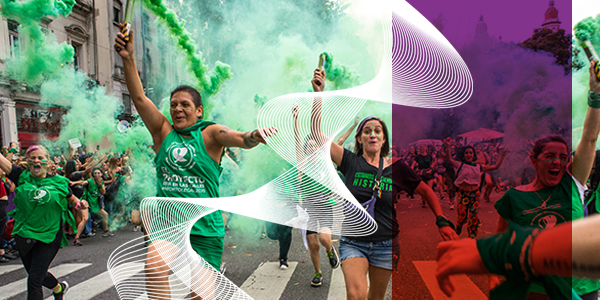
|
| |
|
|
| |
|

|
| |
|
| |
|
The Green Wave
#AbortoLegal2020
At dawn on December 11, Argentina moved one step closer to becoming only the fourth country in Latin America to legalize abortion as the lower house of Congress passed a bill for the legal interruption of pregnancy, 131 in favor to 117 against. The Senate, which rejected a similar bill in 2018, is scheduled to vote on the issue on December 29. As the house deliberated for 20 hours, thousands of women and feminists held a vigil outside in support of reproductive rights and autonomy, implementing an infrastructure of care that allowed them to come together despite the pandemic. In doing so, they defied both the conditions created by the pandemic, but also the conservative backlash that is attacking reproductive rights around the world, as recently seen in Poland.
The passage of the bill – that will save countless lives – is the result of decades of activism by feminists, women, and people with the capacity to gestate, which coalesced in the National Campaign for Right to Legal, Safe, and Free Abortion and also multiplied into numerous associations and organizations, which have been able to connect the criminalization of abortion to other forms of gender-based violence, including economic violence, state violence, and environmental violence, and to the struggle for women’s autonomy – recalling the concept of reproductive justice as developed by Black women in the US to account for the multiple elements that would enable safe and autonomous reproduction.
Still the Argentinian bill, drafted by the government, includes the possibility of conscientious objection, which means that a health care worker or institution can refuse to administer abortion services on the grounds of conscience or religious belief. Since the experience of other countries, such as Italy and Germany, have shown this possibility can significantly undermine access to abortion services, it is therefore fiercely criticized by the Campaign and other feminist groups. The conflict over the right to safe access to abortion will therefore continue.
But – as one speaker at the vigil in Buenos Aires said – public opinion on the question of abortion has changed in the last 15 years in a way that was not imaginable then. In any case, the effect of feminist organizing goes far beyond the parliamentary debate and national borders. December 29 will be the next step for a transnational feminist movement, with the Argentinian National Campaign for Right to Legal, Safe, and Free Abortion calling for solidarity actions all around the world.
#EsAhoraSenado | #AbortoLegal2020
|
|
| |
|
|
|
| |
|
| |
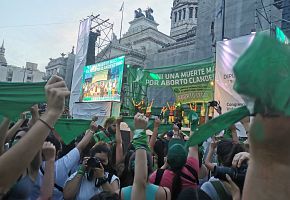 |
| |
| |
On abortion and interruptions
Interview with Martha Rosenberg, Página 12
Netpick
Verónica Gago (Ni Una Menos) interviews Martha Rosenberg, psychoanalyst and longtime feminist activist who had been fundamental in the campaign National Campaign for Right to Legal, Safe, and Free Abortion since its beginnings. They discuss Rosenberg’s new book as well as the genealogy of the struggle for women’s reproductive rights in Argentina.
Read more
|
|
| |
|
|
 |
| |
| |
On reproductive justice
Gwendolyn Wallace, Expecting more
Netpick
Gwendolyn Wallace shows why the fight for abortion rights must be linked to the possibility of having and parenting children in safe and healthy environments. Here she provides a short introduction to the concept of reproductive justice as developed by Black women in the 90s and argues why we need to demand everything, and settle for nothing less.
Read more
|
|
| |
|
| |
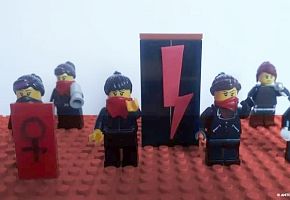 |
| |
| |
The victory will not be legal
Agata Czarnacka, transform! Europe
Netpick
The protests in Poland following the Constitutional Court’s ruling on abortion have broadened into a wider opposition. This is necessary, as the only way out “will be to change the government and the entire legal system with it”.
Read more
|
|
| |
|
|
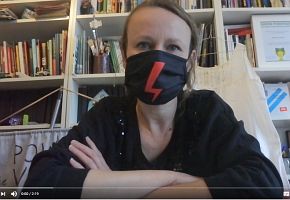 |
| |
| |
Poland – After the headlines
Anna Krenz, Polish abortion rights activist
Video
Anna Krenz, Polish abortion rights activist from Dziewuchy Berlin speaks about the current situation in Poland, the greater importance of the conflict in a catholic country and the urgency to act - as a transnational feminist movement.
Read more
|
|
| |
|
| |
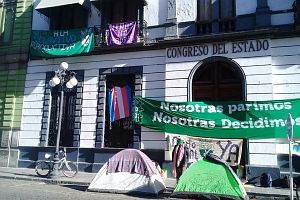 |
|
Taking over Mexico
Feminist and transfeminist activist have taken over the Congresses in Puebla and Quintana Roo and demand their right to safe abortions.
Read more
|
|
| |
|
| |
Events |
| |
|
| |
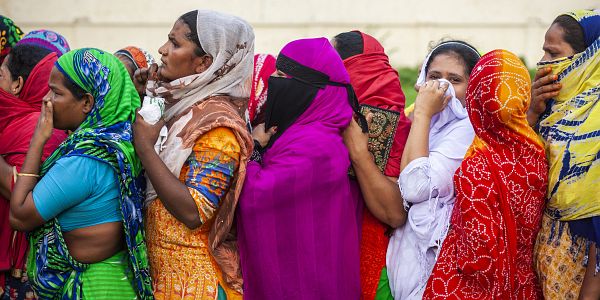
|
| |
Feminist Insights: Resilience and Resistance in Times of COVID-19, 15 December |
 |
|
| |
|
| |
|
| |
|
15
|
|
Online on Facebook,
15.12.2020
18.30 – 20.00 Berlin // 14.30-16.00 Rio de Janeiro // 19.30 – 21.00 Amman // 23.00 – 0.30 Delhi |
| |
Feminist Insights: |
| |
Resilience and Resistance in Times of COVID-19 |
| |
Women have been at the forefront of the fight against the COVID-19 pandemic since it began, working tirelessly to resist injustice, enhance solidarity, and to envision sustainable solutions for their communities despite movement restrictions, scarcity of funds, and uncertainties about the future. Anielle Franco (Brazil), Kristina Kaghdo (Jordan) and Radhika Menon (India) discuss what that means in their respective countries.
|
|
|
| |
|
|
| |
|
| |
|
| |
Media |
| |
|
| |
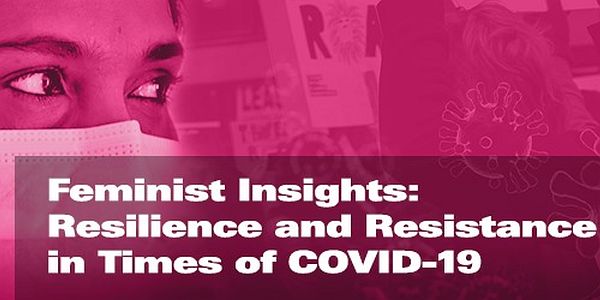 |
| |
|
| |
|
| |
|
Dossier: Perspectives from the Global South
More voices on Feminist Insights, Resilience and Resistance in Times of COVID-19 – also from Argentina, Ecuador, Zimbabwe and the Philippines – can be found in the corresponding dossier, by Kristina Hinz and Izadora Zubek.
|
|
| |
|
| |
|
| |
|
 |
|
 |
|
De/Constructing Internationalism
Even in the pandemic, feminist movements draw on their experience of transnational organizing.
|
|
| |
|
| |
|
| |
|
 |
|
 |
|
transform! europe: The Project of a Marxist Feminist International
Frigga Haug, Heidemarie Ambrosch, Nora Räthzel, Diana Mulinari and Jule Goikoetxea on the growing Marxist feminist project, its possibilities and practices.
|
|
| |
|
| |
|
| |
|
Image credits:
- Header image: Ana Cea
- On abortion and interruptions: Alex Wischnewski
- On working towards reproductive justice: Charlotte Cooper, via Flickr, CC-BY 2.0
- Poland – Revolution in times of the pandemic: Anna Krenz
- Mexico – Taking over: Coatlicue SiempreViva
- Feminist Insights: UN Women Asia and the Pacific, via Flickr, CC-BY-NC-ND 2.0
- Frigga Haug: Franziska Stier
|
|
| |
|
| |
|
| |
|
|
| |
If you want to unsubscribe from this newsletter (with the email adress {#EmailTo#}) you can do this here.
|
| |
|
|
|
|
| |
|
|










